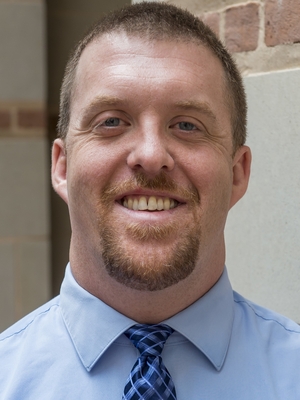You have /5 articles left.
Sign up for a free account or log in.
 Joshua Eyler is the director of @RiceCTE and adjunct associate professor of humanities at Rice University. His forthcoming book is How Humans Learn: The Science and Stories Behind Effective College Teaching.
Joshua Eyler is the director of @RiceCTE and adjunct associate professor of humanities at Rice University. His forthcoming book is How Humans Learn: The Science and Stories Behind Effective College Teaching.
Q: Josh, for my question to you, I'm going to quote from your Rice University bio:
"After receiving his Ph.D. in medieval studies from the University of Connecticut in 2006, Josh moved to a position as assistant professor in the English department at Columbus State University in Georgia. Although he was approved for tenure (emphasis mine) at CSU, his love for teaching and his desire to work with instructors from many different disciplines led him to the field of faculty development and to George Mason University, where he served as an associate director of the Center for Teaching and Faculty Excellence from 2011 to 2013. In August of 2013, he came to Rice to take the position of director of the [Center for Teaching Excellence]."
So my first question is, why would anyone who was just offered a job for life decide to go into our teaching and learning world where tenure (for almost all of us) is not a thing?
A: This was a very personal decision and one I did not make without some degree of trepidation. I was searching for an opportunity to contribute to pedagogical initiatives on a larger scale, and I wanted to participate in the national dialogue about teaching and learning in higher education. Ultimately, tenure was less important to me than the ability to work across departments, units and institutions to improve student learning.
I am grateful to Kim Eby at George Mason University for giving me my first position in a teaching center and to all the other mentors I’ve had in this field. One thing I love about my job is that (even without tenure) I still get to do all of the things I really liked about being a faculty member -- teaching, researching, writing -- but now they comprise one part of a multifaceted, exciting career devoted to teaching and learning.
Q: Let's talk about your upcoming book. The buzz in our world is strong. Can you share with us why you wrote this book, and the big takeaways that you want everyone in higher education to know about?
A: We know a ton about which teaching strategies are most effective for helping students to learn and which ones are not. There is obviously a wealth of research on the subject, and I think it’s fair to say that we have a core of evidence-based practices for virtually any pedagogical situation. There are also fabulous resources and handbooks that explain how to implement these techniques step by step.
What we don’t know a lot about, however, is why these strategies work so well. This question has gnawed at me ever since I started to teach, and in searching for an answer, I found that I needed to look at fields like anthropology, biology and psychology, among others.
Two key takeaways from the book are 1) Human beings learn in ways that are very similar. Those mechanisms by which we first sought to understand the world as babies are still a part of the way we learn new things. 2) As teachers, we need to know all we can about this process in order to make the best decisions about pedagogy as possible.
Q: In our exchanges on Inside Higher Ed and Twitter, you have been critical of the idea that our work -- the work at the place for learning innovation and postsecondary organizational change intersects -- has the potential to coalesce into a new academic discipline. Can you elaborate on your critique?
A: I wouldn’t say that I’m against the idea, per se. I just think we need to be cautious. We need to really think about our goals for developing a new discipline. We should ask ourselves whether or not we can reach these goals through creative interdisciplinary collaborations.
If the answer is yes, then we may not need to draw stark disciplinary boundaries around ourselves just yet.
If, however, we see obstacles to developing the new knowledge and approaches we are striving for, then maybe a new discipline is in order after all. I’m all for thinking through the possibilities.
Q: Last question. Can you share one thing about yourself that maybe folks don't know?
A: I was an NCAA athlete -- a wrestler for Gettysburg College, which is a Division III school. I was not, shall we say, the cream of the crop, but I loved every minute of it. To this day, I still use much of what I learned from my best coaches in my teaching. It was a formative experience and helped to shape my approach to working with students.
What would you want to ask Josh Eyler?








